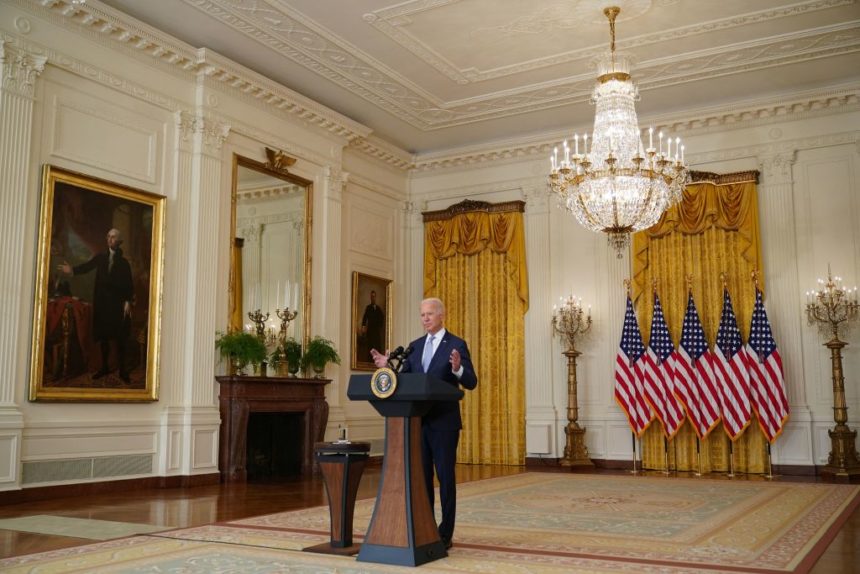Congress continues to move closer to a sweeping reform on drug pricing, with lawmakers set to decide what to include in President Biden’s proposed $3.5 trillion reconciliation bill. After years of delays and false starts, the process is suddenly moving quickly: This week, lawmakers will debate one component of the reconciliation package. The pharma industry, in turn, will ramp up its efforts to argue that drug pricing regulation will harm research and development — not to mention its hard-won gains in fighting COVID-19.
Drug pricing has been on the minds of Democrat and Republican lawmakers alike for years, but the issue was once again shelved as the government wrestled with the pandemic. In August, however, President Biden called on Congress to include drug pricing reform in the reconciliation bill. This represented the most concrete statement he’d made on the matter to date, and signaled that the administration was serious about getting something done sooner than later.
Today, tangible action on pricing appears even closer. According to Terry Haines, founder of healthcare policy consultancy Pangaea Policy, that’s mostly due to two major factors.
“You have the continued strong interest from the public in wanting to address what they perceive as high drug prices,” Haines explained. “President Biden has made a bigger and bigger deal out of it.”
But perhaps even more importantly, drug pricing reform could potentially pay for the much larger reconciliation initiative Democrats hope to pass, Haines says.
“Frankly, pricing is a very large money-raiser,” Haines said. “Any issue in Washington that the vast majority of the public wants to see action on, and which is a significant revenue raiser, is right in the bullseye.”
A recent poll from Kaiser Family Foundation found that eight in 10 adults believe prescription drug costs are unreasonable, with three in 10 adults saying they don’t take their medication as prescribed because of those high costs.
The current proposal would allow Medicare to negotiate drug prices. In addition to potentially saving the government hundreds of billions of dollars, this change could lower out-of-pocket costs for millions of Americans.
Not surprisingly, the pharma industry isn’t taking the threat lying down. It has ramped up its lobbying efforts even further, focusing on the industry’s continued leading role in the battle against COVID-19 and, in particular, the Delta variant. The industry has argued that upping regulation and taxes could hamstring those efforts.
In a recent blog post, industry lobbying group PhRMA argued that recent polls on the public’s support of drug pricing reform were misleading, and that restrictions on drug pricing would actually lower access to medication for patients.
“The fact is that non-partisan, independent public polls have repeatedly demonstrated that once Americans understand what government ‘negotiation’ is and what the tradeoffs are – restrictions in access or a slowdown in innovation for new treatments – support evaporates,” wrote Tom Wilbur, PhRMA’s director of public affairs. “When it comes to addressing patients’ true priorities, policymakers should instead focus on a better way to improve affordability for patients while protecting access and the future development of new cures and treatments.”
The argument that pricing regulation could negatively impact innovation, research and development is a familiar one. But Haines believes that it no longer holds as much power to sway Congress.
“[The pharma industry] hasn’t made a convincing case to Democratic members that research and development is going to be negatively affected,” Haines explained. “That’s certainly a concern, but when presented with that argument members say, ‘Tell me how providing the government a role in negotiating prices under Medicare Part D amounts to inhibiting research and development?’ And it’s a difficult thing for the industry to get past.”
This week’s markups may prove a litmus test as to whether Congress will tackle the issue. Once the results are revealed, the level of concern among financial markets will either ramp up or deflate.
Haines believes that while the fate of the reconciliation bill is uncertain, a passage of legislation that includes drug pricing reform is, at least at the moment, likelier than not due to its potential to fund the legislation itself.
“You’re looking at $600 billion out of $3.5 trillion, which is a fifth or a sixth of the entire cost of the legislation,” Haines explained. “That’s not something that gets jettisoned easily if they’re committed to it and the Democratic president says to a Democratic Congress, like he did last month, ‘This is something I really want to make happen.’”
But for now, Haines believes the matter is almost entirely out of pharma’s hands, despite its significant financial investments in the form of ads and lobbyists.
“You’ll have a lot of investors in the industry with concerns for the next few months as this thing either winds through and becomes more likely or falls off the table entirely, for reasons that have very little to do with pharma,” Haines said. “It’s about whether Democrats put this thing together or not. Which raises the anxiety level: If pharma is the focal point in the legislation that’s one thing, but pharma’s just along for the ride.”








